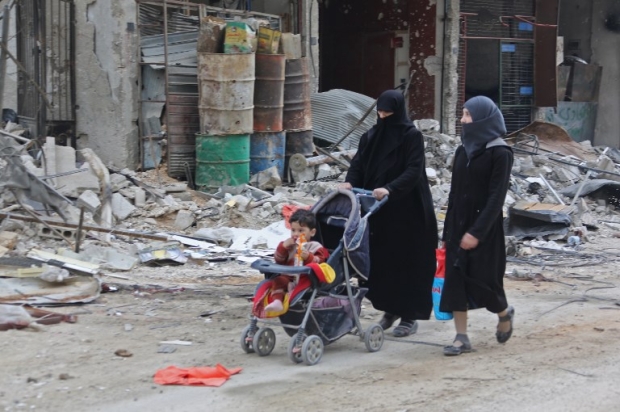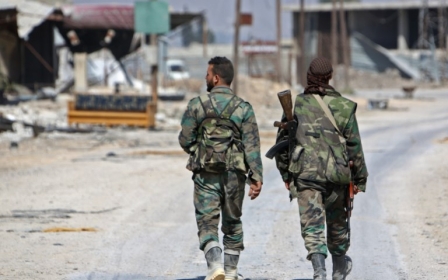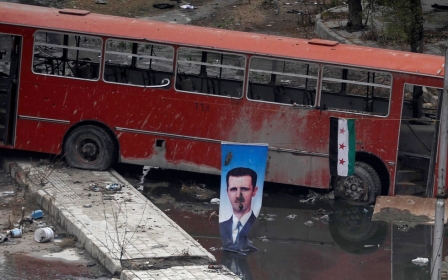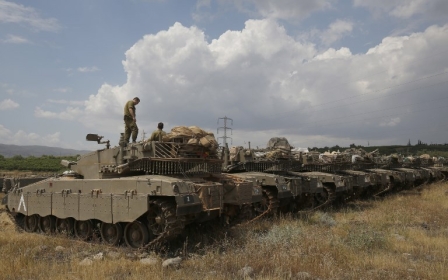Will the south be Syria’s next battlefield?
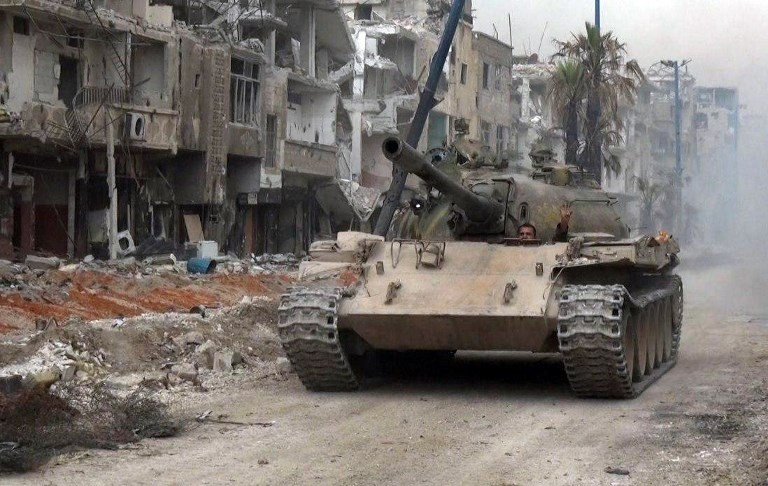
Syria’s army has recently built up its presence in the south, calling on the remaining rebels there to surrender or face a new assault. While some may accept reconciliation, the majority have already declined, and Syria’s previously quiet southern front will likely be awoken imminently.
Few give the rebels much chance. The grim tactic of heavy government and Russian bombardment followed by a ground assault to force opposition enclaves into accepting evacuation - seen recently in Damascus - is expected again.
President Bashar al-Assad’s desire to reconquer the south requires little explanation. Having cleared Damascus of the last rebel forces, Assad is keen to claim victory and project normality at home and abroad. While swaths of eastern and northern Syria remain in enemy hands, the south is the last significant holdout close to the capital.
The role of Israel
Syria’s rebellion began in the southern city of Daraa, and its full recapture would prove symbolically valuable. There is also an important economic component: the rebels hold Syria’s border crossings into Jordan. Their conquest would greatly boost Jordanian-Syrian trade and, consequently, the ailing economy.
The impetus for the assault, however, comes from outside. Russia is rumoured to have agreed with neighbouring Israel to permit Assad to re-enter the south on the condition that no Iranian-backed militia, including Hezbollah, are present.
As has so often been the case in the Syria conflict, Assad’s domestic opponents have been sacrificed by their international allies for wider regional priorities
Israel has happily seen Assad and his allies distracted by civil war for years, intervening only occasionally. However, with Assad now looking secure, Israel fears the prospect of a permanent Iranian-Hezbollah presence in Syria, especially along the occupied Golan Heights.
Assad’s recent successes have therefore come alongside a sharp increase in Israeli-Iranian hostility, including a May rocket attack on the Golan followed by a massive Israeli retaliation on Iranian targets deep inside Syria.
Any Russian-mediated plan may reduce tensions. It won’t keep Hezbollah and Iran out of Syria, as Israel ultimately desires, but in theory, it means that the Israeli army would only face Hezbollah along the Lebanese border, not in the Golan Heights.
Ironically, the Syrian army will act as a buffer between Israel and Iran, with Israel less fearful of Assad and believing Russia can reign him in. Some rebel commanders have claimed that Iran will still get around this by dressing its militia in Syrian army uniforms. However, should this be proven to happen, Israel will likely have Russia’s blessing to retaliate.
Russia and Iran
The agreement would mark the latest shift between Assad’s two patrons. Both Russia and Iran are committed to keeping Assad in power, likely to remain in Syria for some time and unlikely to turn on one another, despite what some fantasists in Washington hope.
But their interests are aligned, not identical, and Israel is arguably the greatest area of divergence. While Iran hopes to maintain pressure on its enemy, Russia sees mediation with Israel as one indicator that its involvement in Syria has transformed it into a regional heavyweight to rival the US.
The recent US decision to ditch the nuclear deal and sanction Iran has had the byproduct of strengthening Moscow’s hand vis-a-vis Tehran in Syria. Iran is now on the defensive, giving Russia increasing primacy. An agreement that sees Moscow persuade Assad to push Iranian and Hezbollah forces away from the Golan would confirm this shift.
The US itself has remained quiet on the prospect of any forthcoming southern assault. The US is a guarantor to the 2017 “de-escalation zone” truce, one of the few agreements on Syria made by President Donald Trump, alongside Russia and Jordan, and not a hangover from the Obama administration.
In the past, US diplomats might have been alarmed at the reputational damage of allowing their security guarantees to be violated so blatantly. Yet Trump has shown only fleeting interest in Syria - limited to headline-grabbing missile strikes - and is not expected to fuss over the assault, especially given its endorsement by his Israeli allies.
Indeed, it is rumoured that the US will soon dismantle its only military presence in the south at al-Tanf, provided Iranian forces remain out. This would further boost Assad, as it would open another border crossing, this time with Iraq.
Cross-border trade with Jordan
A final external player quietly supporting the assault is Jordan, another guarantor of the de-escalation zone agreement. Jordan publicly opposes Assad but has recently softened, with a trade delegation visiting Damascus in May.
Some suspect Amman is courting Iran, in light of recent coldness from its traditional allies, Saudi Arabia and the US. The reality is likely more motivated by Jordan’s precarious domestic situation, with public anger growing over its failing economy.
King Abdullah has sympathy for the southern rebels - who are among the most moderate in Syria’s opposition, and some of whom have family ties to northern Jordanians - but also recognises the need for the conflict to end.
Like Syria, Jordan would benefit from a resumption of cross-border trade. In addition, the pacification of the south might allow some of the 700,000 Syrian refugees in Jordan, seen to be straining the economy, to return home. A quick but successful campaign by Assad that didn’t push more refugees into Jordan would be quietly welcomed.
The international forces opposing Assad’s advance south are thus dissipating. All gain something from a Syrian army advance. Even Iran, if forced to retreat as a condition for the attack, would not oppose its ally reconquering rebel territory, perhaps believing it could seek redress in the future.
Inevitable outcome?
As has so often been the case in the Syria conflict, Assad’s domestic opponents have been sacrificed by their international allies for wider regional priorities.
Questions remain over how quickly Assad will be able to advance, and whether he will prioritise an advance eastwards for the Jordanian border posts, or westwards to secure the Golan borderlands while Israel is seemingly acquiescent. Urban fighting for the rebel-held parts of Daraa may also take longer than anticipated.
However, the eventual outcome seems inevitable: abandoned by their allies, the rebels’ days in southern Syria appear numbered.
- Christopher Phillips is reader in international relations at Queen Mary, University of London and associate fellow at Chatham House’s Middle East and North Africa Programme. He is author of The Battle for Syria: International Rivalry in the New Middle East, a new updated paperback edition of which is available from Yale University Press.
The views expressed in this article belong to the author and do not necessarily reflect the editorial policy of Middle East Eye.
Photo: A Syrian army tank advances in the southern outskirts of Damascus on 10 May 2018 (AFP)
New MEE newsletter: Jerusalem Dispatch
Sign up to get the latest insights and analysis on Israel-Palestine, alongside Turkey Unpacked and other MEE newsletters
Middle East Eye delivers independent and unrivalled coverage and analysis of the Middle East, North Africa and beyond. To learn more about republishing this content and the associated fees, please fill out this form. More about MEE can be found here.



